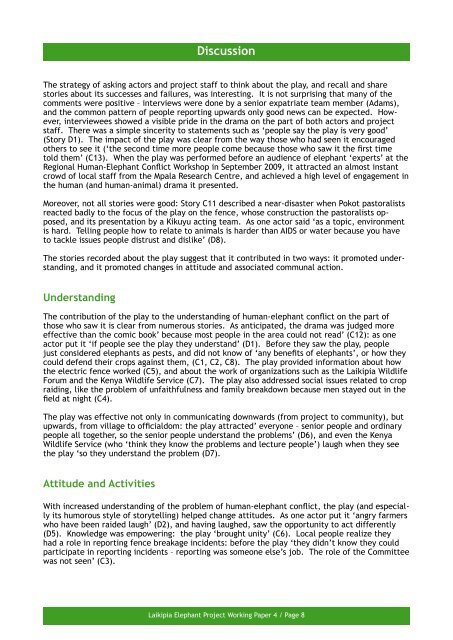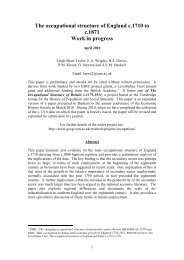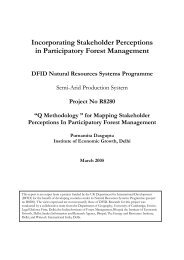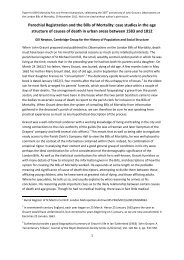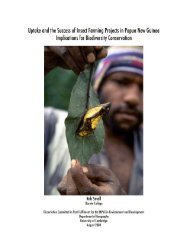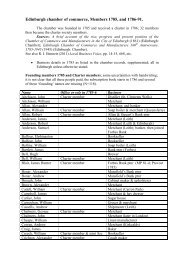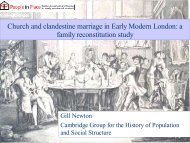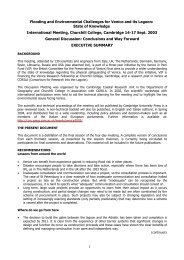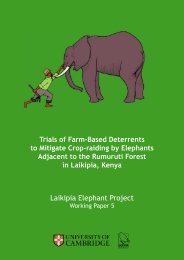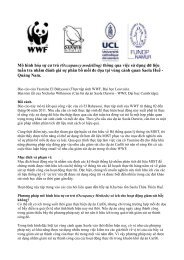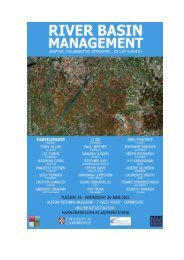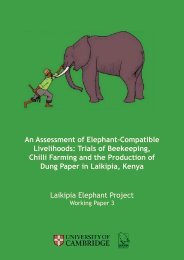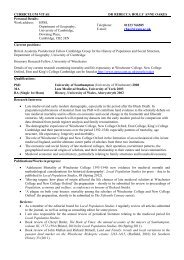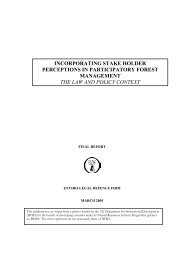Laikipia Elephant Project - University of Cambridge Department of ...
Laikipia Elephant Project - University of Cambridge Department of ...
Laikipia Elephant Project - University of Cambridge Department of ...
Create successful ePaper yourself
Turn your PDF publications into a flip-book with our unique Google optimized e-Paper software.
Discussion<br />
The strategy <strong>of</strong> asking actors and project staff to think about the play, and recall and share<br />
stories about its successes and failures, was interesting. It is not surprising that many <strong>of</strong> the<br />
comments were positive – interviews were done by a senior expatriate team member (Adams),<br />
and the common pattern <strong>of</strong> people reporting upwards only good news can be expected. However,<br />
interviewees showed a visible pride in the drama on the part <strong>of</strong> both actors and project<br />
staff. There was a simple sincerity to statements such as ‘people say the play is very good’<br />
(Story D1). The impact <strong>of</strong> the play was clear from the way those who had seen it encouraged<br />
others to see it (‘the second time more people come because those who saw it the first time<br />
told them’ (C13). When the play was performed before an audience <strong>of</strong> elephant ‘experts’ at the<br />
Regional Human-<strong>Elephant</strong> Conflict Workshop in September 2009, it attracted an almost instant<br />
crowd <strong>of</strong> local staff from the Mpala Research Centre, and achieved a high level <strong>of</strong> engagement in<br />
the human (and human-animal) drama it presented.<br />
Moreover, not all stories were good: Story C11 described a near-disaster when Pokot pastoralists<br />
reacted badly to the focus <strong>of</strong> the play on the fence, whose construction the pastoralists opposed,<br />
and its presentation by a Kikuyu acting team. As one actor said ‘as a topic, environment<br />
is hard. Telling people how to relate to animals is harder than AIDS or water because you have<br />
to tackle issues people distrust and dislike’ (D8).<br />
The stories recorded about the play suggest that it contributed in two ways: it promoted understanding,<br />
and it promoted changes in attitude and associated communal action.<br />
Understanding<br />
The contribution <strong>of</strong> the play to the understanding <strong>of</strong> human-elephant conflict on the part <strong>of</strong><br />
those who saw it is clear from numerous stories. As anticipated, the drama was judged more<br />
effective than the comic book’ because most people in the area could not read’ (C12): as one<br />
actor put it ‘if people see the play they understand’ (D1). Before they saw the play, people<br />
just considered elephants as pests, and did not know <strong>of</strong> ‘any benefits <strong>of</strong> elephants’, or how they<br />
could defend their crops against them, (C1, C2, C8). The play provided information about how<br />
the electric fence worked (C5), and about the work <strong>of</strong> organizations such as the <strong>Laikipia</strong> Wildlife<br />
Forum and the Kenya Wildlife Service (C7). The play also addressed social issues related to crop<br />
raiding, like the problem <strong>of</strong> unfaithfulness and family breakdown because men stayed out in the<br />
field at night (C4).<br />
The play was effective not only in communicating downwards (from project to community), but<br />
upwards, from village to <strong>of</strong>ficialdom: the play attracted’ everyone – senior people and ordinary<br />
people all together, so the senior people understand the problems’ (D6), and even the Kenya<br />
Wildlife Service (who ‘think they know the problems and lecture people’) laugh when they see<br />
the play ‘so they understand the problem (D7).<br />
Attitude and Activities<br />
With increased understanding <strong>of</strong> the problem <strong>of</strong> human-elephant conflict, the play (and especially<br />
its humorous style <strong>of</strong> storytelling) helped change attitudes. As one actor put it ‘angry farmers<br />
who have been raided laugh’ (D2), and having laughed, saw the opportunity to act differently<br />
(D5). Knowledge was empowering: the play ‘brought unity’ (C6). Local people realize they<br />
had a role in reporting fence breakage incidents: before the play ‘they didn’t know they could<br />
participate in reporting incidents – reporting was someone else’s job. The role <strong>of</strong> the Committee<br />
was not seen’ (C3).<br />
<strong>Laikipia</strong> <strong>Elephant</strong> <strong>Project</strong> Working Paper 4 / Page 8


